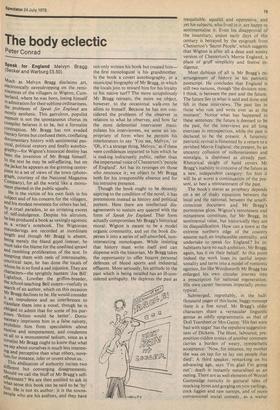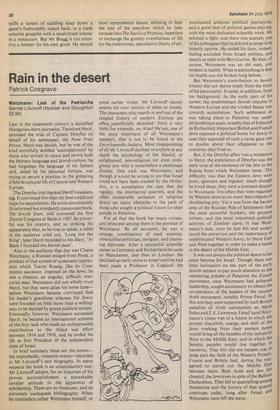The body eclectic
Peter Conrad
Speak for England Melvyn Bragg (Secker and Warburg £5.50)
Much as Melvyn Bragg disclaims art, electronically eavesdropping on the reminiscences of the villagers in Wigton, Cumberland, where he was born, losing himself In admiration for their sublime ordinariness, the problems of Speak for England are Mostly aesthetic. This garrulous, populist memoir is not the spontaneous chorus its compiler believes it to be, but a formalist cOntraption. Mr Bragg has not evaded literary forms but confused them, conflating documentary history with sentimental pastoral, political oratory and finally autobiograPhY—for Wigton's historical destiny has been the invention of Mr Bragg himself. In the text he may be self-effacing, but on the jacket he appears as the grinning centrePiece to a set of views of the town (photograph, courtesy of the National Magazine Company), for all the world like a monument planted in the public squak. He is the victim of his own faith in his subject and of his concern for the villagers, and his modest reverence for others has led, by a cruel paradox, to an irritating excess of self-indulgence. Despite his altruism, he has produced a book as vexingly egotistic as a writer's notebook. The Wigtonian Maunderings are recorded at inordinate length and though Mr Bragg is absent, being merely the bland good listener, he Must take the blame for the unedited sprawl and rambling proliferation of the text. In tempting them with reels of interminable, uncritical tape, he has done the locals of Whom he is so fond a sad injustice. They are characters—the sprightly bantam `Joe Bill' Lightfoot, Lowther the griffon-breeder, the school-teaching Bell sisters—ruefully in search of an author, which on this occasion Mr Bragg declines to be. He would consider It an impudence and an interference to translate them into a novel, though he is obliged to admit that for some of his purposes 'fiction would be better'. Documentary imprisons him in a false naivety, prohibits him from speculation about Motive and temperament, and condemns us auto a monumental tedium, since as a novelist Mr Bragg ought to know that what We say about ourselves is much less interest!.r113 and perceptive than what others, novelists for instance, infer or invent about us. This abdication of authority incites two different but converging disagreements. Should we call the bluff of Mr Bragg's selfeffacement ? We are then entitled to ask in '.hat sense this book can be said to be 'by' him. He is not its author: it is the townsPeople who are his authors, and they have
not only written his book but created him— the first monologuist is his grandmother. Is the book a covert autobiography, or a municipal biography of Mr Bragg, in which the locals join to reward him for his loyalty to his native turf? The more scrupulously Mr Bragg retreats, the more we object, however, to the occasional walk-ons he allots to himself. Because he has not considered the problems of the observer in relation to what he observes, and how far the most deferential interviewer manipulates his interviewees, we sense an impropriety of form when he permits his interlocutors to say 'You see, Melvyn,' or 'Oh, it's a strange thing, Melvyn,' as if these were confidences imparted to him which he is making indiscreetly public, rather than the impersonal voice of Chesterton's 'people of England'. Art has its revenges on those who renounce it; we object to Mr Bragg both for his irresponsible absence and for his intrusive presence.
Though the book ought to be decently aspiring to the condition of the novel, it has pretensions instead as history and political portent. Here there are intellectual disagreements to sustain any quarrel with the form of Speak for England. That form actually compromises Mr Bragg's historical moral: Wigton is meant to be a model organic community, and yet the book disperses it into a series of self-absorbed, nonintersecting monologues. While insisting that history must write itself and can dispense with the historian, Mr Bragg takes the opportunity to offer bizarre personal defences of blood sports and industrial effluents. More seriously, his attitude to the past which is being recalled has an ill-considered ambiguity. He deplores the past as inequitable, squalid and oppressive, and yet his subjects, who lived in it, are happy to sentimentalise it. Even his disapproval of the insanitary, unjust early days of this century is betrayed by the epigraph from Chesterton's 'Secret People', which suggests that Wigton is after all a dour and wintry version of Chesterton's Merrie England, a place of gruff simplicity and festive indigence.
Most dubious of all is Mr Bragg's rearrangement of history in his patriotic postscript. He concludes that England is still two nations, though 'the division now, I think, is between the past and the future. The future lies in what is said and done and felt in these interviews. The past lies in those who rule and write over us at the moment'. Notice what has happened in
• these sentences: the future is deemed to be the past, for the interviews are all long exercises in retrospection, while the past is declared to be the present. A futuristic patriotic revival is fomented by a return to a perished Merrie England; the present, by an uncanny collusion of millenarianism and nostalgia, is dismissed as already past. Rhetorical sleight of hand covers Mr Bragg's inability to conceive of the future as a new, independent category : for him it will be at worst a continuation of the present, at best a reinstatement of the past.
The book's status as prophecy depends on a set of shaky equations between the local and the national, between the unselfconscious document and Mr Bragg's portentous gloss. Wigton's remoteness and minuteness constitute, for Mr Bragg, its sentimental value, but historically they are its disqualification. How can a town at the extreme northern edge of the country assume such an implausible centrality, and undertake to speak for England? Its inhabitants have no such ambition ; Mr Bragg, again, has it on their behalf. At this point indeed the work loses its tactful impersonality and turns into a model of romantic egotism, for like Wordsworth Mr Bragg has enlarged his own circular journey into a prescription for national regeneration. His own career becomes imperially prototypical.
Submerged, regrettably, in the halfthousand pages of this loose, baggy monster there is a fine novel. Mr Bragg's older characters share a vernacular linguistic genius as oddly epigrammatic as that of Doll Tearsheet or Mrs Gamp. 'His feet were bad with sugar' has the repulsive suggestiveness of Dickens. The blunt, laboured, preposition-ridden syntax of another comment carries a burden of weary, sympathetic acceptance: 'Now, for instance, my mother she was on tap for to lay out people that died'. A third speaker, remarking on his advancing age, says 'I'm glad I'm going out': death is instantly naturalised as an outing. There are as well elements of Worzel Gummidge rusticity in guttural tales of mucking byres and gorging on yow yarlings, cock liggies and raw turnips, and of more conventional social comedy, as a waiter spills a tureen of scalding soup down a guest's fashionably naked back, or a trade unionist grapples with a recalcitrant lobster in a restaurant. But Mr Bragg is too attentive a listener for his own good. He should have remembered James, refusing to hear the end of the anecdote which he later remade into The Spoils of Poynton, im pat ient to exchange the gossipy eventfulness of life for the indecorous, speculative liberty of art.



































 Previous page
Previous page